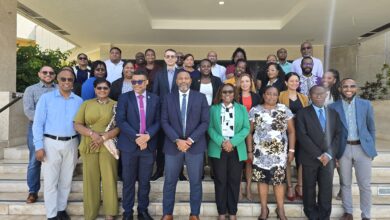Rt. Hon. Said Musa, Prime Minister of Belize
Hon. Julian Hunte, President of the UNGA and Minister of External Affairs, International Trade and Civil Aviation of Saint Lucia
Honourable Ministers
Director General of the CRNM
Delegates
Staff of the Secretariat
Members of the Media
Ladies and Gentlemen
Welcome to this the Sixteenth Meeting of the Council for Trade and Economic Development of the Caribbean Community. Let me begin by first thanking the Government and People of Belize for their generous offer to host the Sixteenth Meeting of the Council for Trade and Economic Development. I am sure that all your Caribbean colleagues will agree with me that the hospitality and arrangements for this meeting have been in keeping with the fine tradition that Belize has in this regard.
Ladies and Gentlemen, it is fitting that this, the Sixteenth Meeting of the Council for Trade and Economic Development (COTED) is being held here in Belize as we begin the round of ministerial council meetings for 2004. I say this largely because Belize holds the portfolio for the Environment and Sustainable Development in CARICOM’s quasi-Cabinet and later this year, the United Nations will be hosting the SIDS+10 Conference in Mauritius, which will focus heavily on the environment and the sustainable development of our world – a dominant theme on our Community’s agenda today.
That conference brings with it an opportunity for us as small island developing states to help reset the global course which has gone awry, if we are to judge by events over the past decade. Given the preoccupation of the conference, and the composition of our Community of small islands and low-lying states, one immediately recognises its significance to our Member States, for most of whom, it can truly be said, the term small island developing states was created. Indeed the Mauritius Conference is truly Barbados + 10, the original conference having taken place in Barbados in 1994.
This Ministerial Council, the first for the year is being held against a background of our Caribbean Community being severely tested. How we respond in the coming weeks and months will go a long way in proving how much we have matured over the past thirty years. The only view I wish to express at this time is if events of the past week in our newest Member State, Haiti, do not drive home to all of us that more than ever we need to strengthen our cooperation relying more on ourselves and less on others, then we are virtually doomed as a Caribbean civilization.
As Secretary-General of the Caribbean Community, it is for me and my staff truly a most challenging time. This meeting of the COTED therefore comes at a good time, as it demonstrates that nothing should and could stop the march of the Community towards the achievement of its goal of providing a better life for its citizens.
Over the next two days, ministers will have an opportunity to deliberate on issues that have occupied the hard working officials – our brothers and sisters in the struggle – over the past two and a half days. As has become the norm with COTED, the meeting is faced with a near daunting agenda but I am reasonably certain that drawing from the work that has been put in prior to today, good results will be forthcoming.
Ladies and Gentlemen, the COTED has as its main responsibility, the establishment and functioning of the CARICOM Single Market and Economy (CSME). As you are all aware, many have been continuously expressing concern over the deliberate pace at which this flagship activity of the Community is progressing. And again although there have been some positives in that regard over the past year, there still remain areas which are progressing less than satisfactorily.
In that regard, I well recall that it was here in Belize in 2002 at the Thirteenth Inter-Sessional Meeting of the Heads of Government that agreement was reached on a schedule for the removal of restrictions, which envisaged a completion date beginning at the end of 2003 in the move to finally completing the removal of restrictions and establishing the Single Market by the end of 2005. I am aware that there has been significant movement in this regard but there still remains enough unfinished business to cause disquiet.
We have not met the important milestone of withdrawal of restrictions and this is a serious matter that goes to the heart of the issue of delivery of an early harvest to the people of the region. In the final analysis our tardiness, negates the efforts of self employed persons, companies, consumers and wage earners to make the CSME, a lived experience as one Prime Minister is so often wont to say. We cannot continue to disappoint them. 2005 is but nine months away, let us make the telling surge here that will bring the end in sight.
There is no doubt that there are challenges but if we are to adequately protect our interests in matters external as well as internal to the Community, there must be a more concerted effort to surmount these challenges. Only yesterday, the Strategy Session on External Negotiations called for a speeding up of the implementation of the CSME, as among other things, it constrains and endangers the process of external trade negotiations. We are particularly concerned as we face the finalization of our preparations for the negotiation of an Economic Partnership Agreement with the EU.
Let me end on a bit of good news. On Monday next week the Prime Minister of Jamaica and Chairman of CARICOM, The Most Hon. P.J. Patterson will sign the CARICOM/Costa Rica Free Trade Agreement. Yes, Ladies and Gentlemen, these are tough times but hard work brings success.
What is therefore important in today’s scenario is that it is now more than ever critical that we do not lose the plot and become sidetracked in matters that dissipate our energies, spread our already thin resources even thinner, and engage in activities that run counter to the spirit of integration. Also, borrowing from the Bahamians, remember, we do better when we do it together!
Let us never lose sight of that fact and let it guide us in our deliberations over the next two days.





